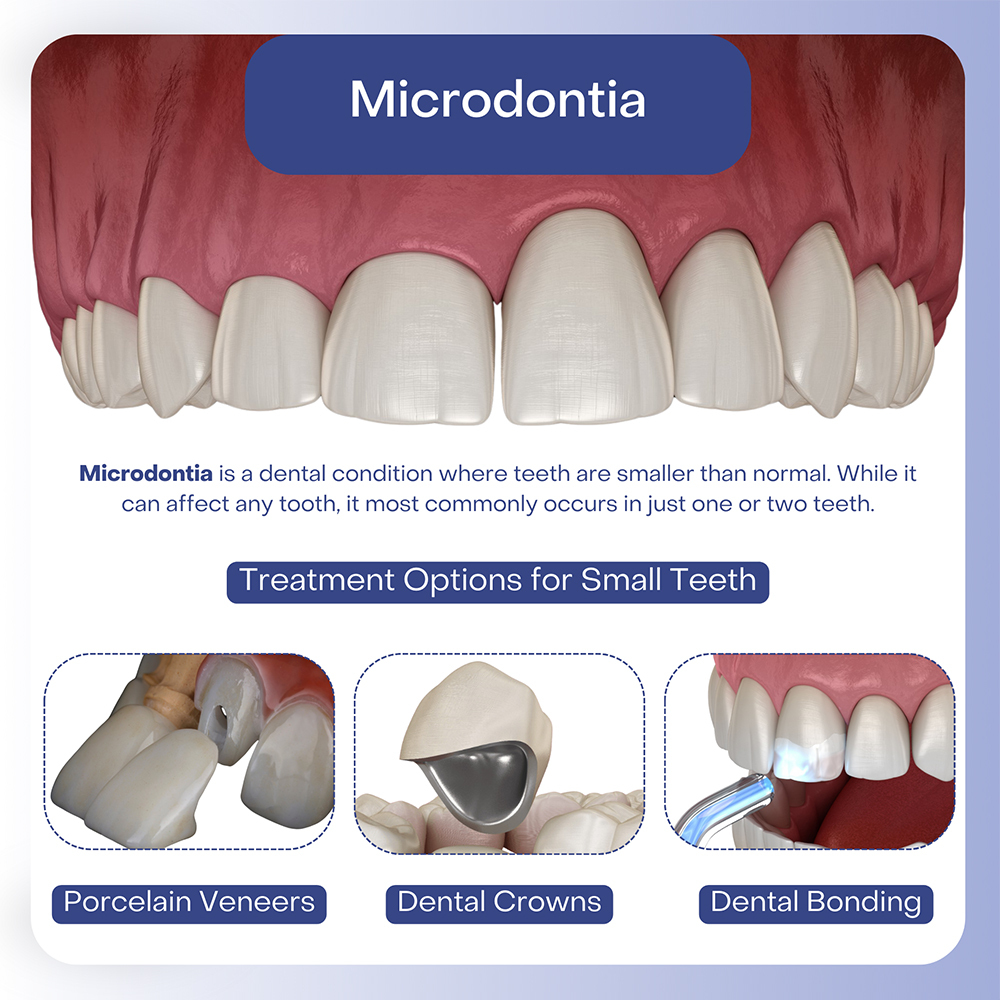Table of contents
 There are several types of microdontia, including:
There are several types of microdontia, including:
Localized microdontia is the most common, where a single tooth is smaller than normal compared to neighboring teeth. It usually affects teeth in the upper jaw. The lateral incisors, the teeth on either side of your two front teeth, are the most likely to be affected.
Sometimes, the shape of the lateral incisor is normal, but often, it’s shaped like a small peg. Some people will have a smaller lateral incisor on one side, and their permanent adult lateral incisor will be missing entirely on the other. Other people may have a baby lateral incisor that remains in place with no adult tooth underneath it to come through.
If someone has a larger jaw or a protrusive jaw, they may be diagnosed with relative generalized microdontia. In this case, it doesn’t mean their teeth are smaller than average, but their jaw size makes them appear smaller.
This is the rarest form of microdontia, usually affecting people with a medical condition like pituitary dwarfism and where all their teeth are uniformly smaller.
Most people will only have one or two small teeth, and it can be due to inherited or environmental factors. In addition to pituitary dwarfism, these can include:
Other rare genetic syndromes may cause problems like underdeveloped or smaller teeth. Microdontia can be seen with hypodontia, a condition where someone has fewer teeth than normal.
Sometimes, small teeth do not need to be fixed if they don’t cause problems and you are happy with their appearance. However, when teeth are abnormally small or have large gaps between them, problems can arise.
Small teeth may not fit together properly, and the gaps between them can act as food traps, increasing the risk of tooth decay and gum disease. Additionally, small teeth may mean your other teeth are at risk of increased wear and tear.
If you have small teeth, make an appointment to come and see us at My New Jersey Dentist. We can assess your teeth, listen to your concerns, and offer possible treatment options. Most people’s concern is their aesthetic appearance, and they want to improve the appearance of their smile.
Several treatments can achieve this and make teeth longer.
Treatments can include:
Veneers for small teeth are thin shells of strong, durable porcelain cemented onto the tooth’s front surface. They are custom-made to provide a more even and uniform appearance. Small teeth veneers can be used to lengthen them and to increase their width, closing or minimizing gaps between teeth.
Porcelain veneers must be made in our on-site dental lab, so the process will take a couple of weeks to complete. For more information call our NJ cosmetic dentist.
A crown is a more substantial restoration. Instead of covering just the tooth’s front surface, the entire tooth is capped right down to the gum line, hiding your natural tooth. It is cemented permanently onto the tooth.
Usually, a dentist must reshape the tooth in preparation for a porcelain crown, removing material so there is enough room for the crown to fit comfortably. However, this may be unnecessary with a small tooth, or less tooth material will need to be removed.
Crowns are also made in our on-site dental lab and are typically ready to fit within two weeks.
Dental bonding is a process that uses composite resin to change the tooth’s shape. It can make teeth appear longer and wider, and treatment is quick to complete.
Treatment is completed chairside so our dentist can apply the composite resin directly to your tooth surfaces, curing or hardening it with light before shaping and polishing it.
Often, a small tooth will not cause any problems or discomfort. Most people seek treatment for small teeth if concerned about the aesthetics or how their teeth fit together.
Sometimes, small teeth can be a sign of an undiagnosed health problem. If you have a family history of genetic disorders or relatives with smaller teeth and have a child, it is worth discussing this with their pediatrician and pediatric dentist. They may recommend genetic testing to determine if any other conditions are present that might require treatment.

My name is Victoria Kushensky. I am a general dentist dedicated to remaining at the forefront of my field. Combining compassionate care with extensive knowledge, I offer cosmetic and general dentistry services as well as advanced root canal treatments.
I earned my Doctor of Dental Surgery (DDS) degree from the esteemed New York University College of Dentistry. Throughout my career, I have honed my skills in various dental procedures, ensuring effective treatment for each patient’s unique needs. I prioritize patient comfort and understanding, taking the time to thoroughly explain procedures and address any questions.
More about Dr. KushenskyMy NJ Dentist: Victoria Kushensky, DDS
385 Prospect Ave Suite 304
Hackensack, NJ 07601
(201) 298-8000